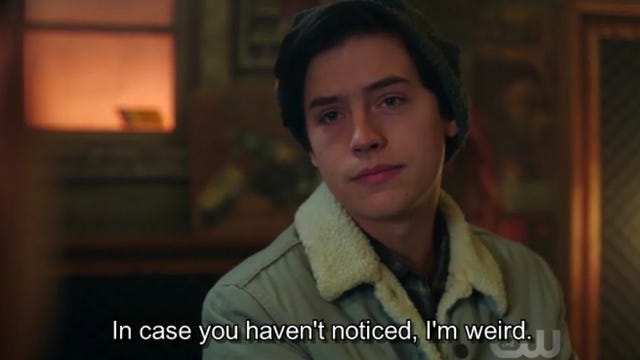Embedded is your essential guide to what’s good on the internet, written by Kate Lindsay and edited by Nick Catucci.
When I use the words “weirdo,” “nerd,” or any others you may have been called in high school, I do it as a fellow weirdo-nerd! —Kate

Ask any OG creator how they got their start on the internet, and almost all of them will tell you the same story: they were an outcast, the weird kid in their high school—but then they went online. The early internet connected millions people across the world, but its most significant benefit to early millennials was the privacy it afforded them to truly be themselves. It was for nerds who wanted to go deep on Harry Potter theories without getting thrown into their lockers, or a secret outlet for others to explore the marginalized parts of themselves. While expressing these parts of their identities in real life would almost certainly lead to social ostracization, online it sometimes earned them unexpected popularity, making them beloved by other weirdos who similarly felt out of place in real life. Those were some of the first people to build followings online—the first of what we would later call influencers.
These weird, nerdy, creative people were responsible for the early internet that we’re now so nostalgic for. They fought for mainstream respect, often fruitlessly—but that’s okay, because they were in it first and foremost for their communities.
Not so for the big influencers and creators of today. They didn’t come to the internet out of social necessity. Many, I’d guess, were already doing just fine in high school. And now, they’re getting popular on an internet where the war for their legitimacy had already been won for them by the nerds. They’re invited to fashion week and receive free products from Hailey Bieber, and make up a one-note, Dyson-air-caressed, get-ready-with-me monolith.
 Tiktok failed to load.
Tiktok failed to load.Enable 3rd party cookies or use another browser
This may sound (uncharacteristically, for me) ungenerous to influencers who I still maintain are workers who deserve respect. But I’ve been, well, influenced by a series of videos by creator Natalya Toryanski, who parodies the “bland influencer cadence”: slow, pause-punctuated treatises on things that are profoundly uninteresting, like their coffee orders or beige outfits. And yet, they have hundreds of thousands, if not millions, of followers, and it’s their bland, white, skinny decisions that now significantly influence popular culture.
This wouldn’t grate at me so much if the nerds had somewhere to go. But as so many have lamented recently, there are no fun, weird places on the internet anymore. We’re all confined to the same handful of social media apps, each in various stages of rot or capitalist desperation. Instead of finding safety in an insular, like-minded community, the internet’s original brand of weirdos are left with no choice but to keep doing what they like to do online, and hoping it remains unnoticed by the now-disproportional mass of “cool” people who will yank it into the spotlight to mock it (think: Jake Novak).
Sure, there are weirdos who have found mainstream success—Brittany Broski comes to mind. But her unabashedly goofy personality grew out of the niche, fandom-focused internet spaces she came up in, and those spaces no longer exist. The next generation is landing on an internet that’s been fully gentrified by cool kids, so it’s not surprising that this is what their content looks like.
It’s a big internet. You can still curate your media diet in such a way that you only consume the fun, niche people on the margins and never hear another person with “bland influencer cadence” again. But you’ll be in the minority. Instead of being a respite from the social hierarchies and cultural ostracization that can occur IRL, the internet has slowly recreated it.




This is so real. I remember when I started fashion blogging and my whole goal was to encourage people to be weird and embrace color and have fun with style. And then in about 2009 or 2010, all these normal people with beige taste started entering the fashion blogging space and it completely changed. It bummed me out then and it still bums me out now.